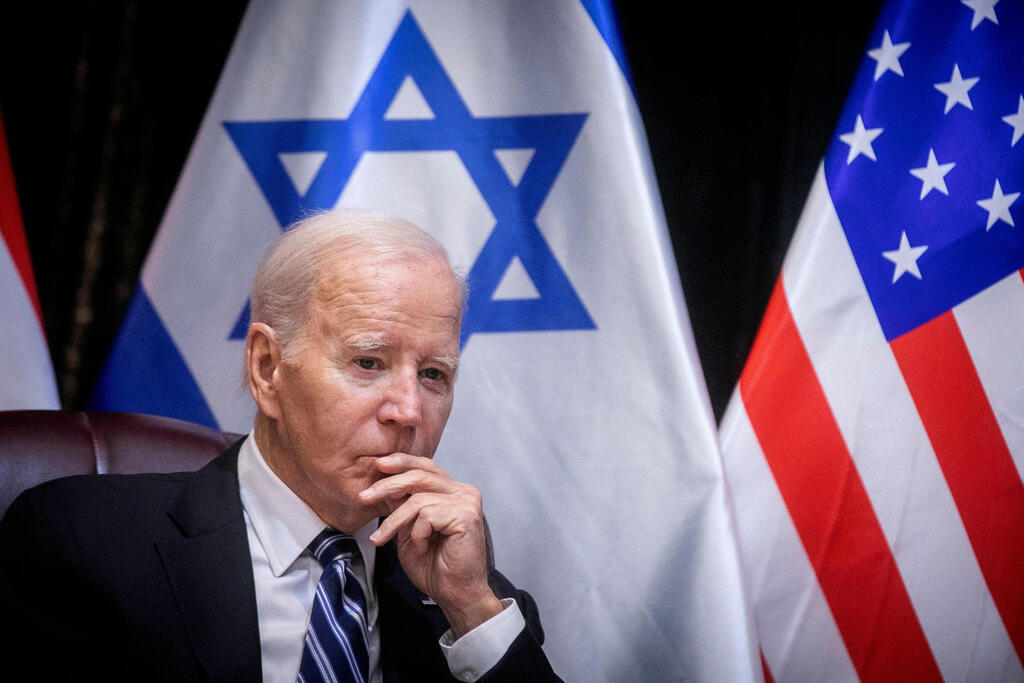Getting your Trinity Audio player ready...
After denials from Israel and the United States, and U.S. President Joe Biden's slip of the tongue and the consequent clarification, the New York Times reported on Sunday that the "Biden administration has advised Israel to delay the ground invasion of Gaza," to secure more time for negotiating the release of the hostages in Gaza and to prepare for the possibility of attacks on American assets in the Middle East by pro-Iran militias.
Read more:
According to the New York Times, the U.S still supports an Israeli Gaza incursion and is not "making a demand" to delay it. However, the release of US hostages Judith and Natalie Raanan led the Biden administration to further pressure Israel to withhold the Gaza invasion. An official who is familiar with the negotiations, done mainly through Qatari mediation, said that Hamas warned that an IDF incursion will lower the chances of releasing additional captives.
3 View gallery


Judith and Natalie Raanan speaking with President Joe Biden after being released from Hamas
(Photo: U.S. Embassy Jerusalem Twitter)
According to American officials, Defense Secretary Lloyd Austin advised Israel to hold off the ground invasion. Austin has been speaking on a nearly daily basis with his Israeli counterpart, Defense Minister Yoav Gallant, as the two discuss operational matters, arms supply to Israel and the U.S military preparedness in the region. Austin has placed the release of the captives as the first priority.
American officials have said they hope that the ground incursion will be delayed but are trying to avoid playing in to the hands of Iran and its allies who already say that the U.S. is secretly controlling Israel. They are trying to prevent a picture of Biden pulling Israel's strings which might drag the U.S. into a confrontation with Iran or its supported militias.
The New York Times also claimed that Americans officials are being careful with their requests of Israel. When Biden met Prime Minister Benjamin Netanyahu in Tel Aviv, the former refrained from making requests and instead asked questions which required answers before the incursion, such as what would be the fate of the captives in the scenario of a ground invasion and how would Israel deal with a war on two fronts. Reportedly, Biden spoke with Netanyahu about the war and referenced the U.S.'s war in Iraq and Afghanistan.
U.S. Secretary of State Antony Blinken didn't fully answer the question on CBS News on Sunday as to whether the United States was asking Israel to delay a ground invasion to allow additional time for hostage negotiations.
“It’s important, as we said, not only what they do, but how they do it,” Blinken said, “particularly when it comes to making sure that civilians are as protected as they possibly can be in this crossfire of Hamas’ making.” At the same time, the U.S. has ordered the departure of several American diplomats from Baghdad and barred its citizens from traveling to the country.
According to the New York Times, an IDF official claimed that Hamas is willing to release approximately 50 hostages with a dual citizenship as part of the ongoing negotiations.
Meanwhile, Gallant and Netanyahu disagree on how to move forward. Gallant supports a large scale military operation against Hezbollah in Lebanon while Netanyahu, backed by the U.S., opposes that idea, fearing the consequences of fighting on two fronts.
After a call between Biden and Netanyahu, the White House announced the continuation of critical humanitarian aid to Gaza. This announcement was not welcomed by the Israeli government, prompting National Security Minister Itamar Ben-Gvir to criticize the decision. The Prime Minister's Office clarified that all international goods were inspected before entering Gaza.




